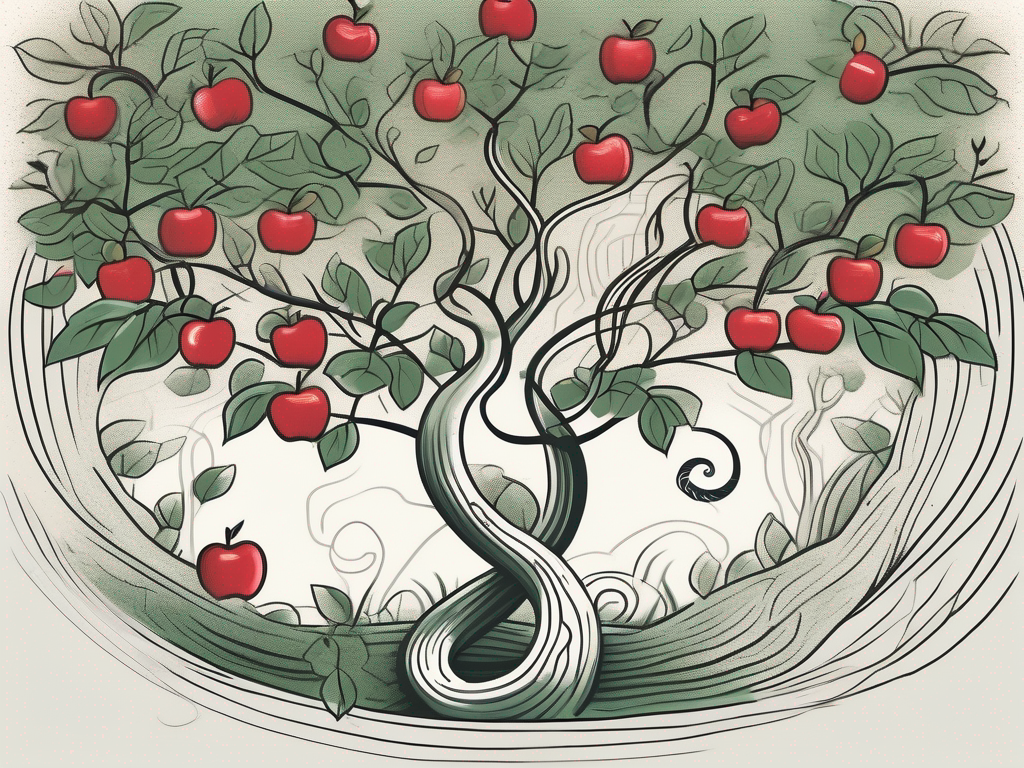Food holds a deep significance in the pages of the Bible. From the very beginning, God created a bountiful garden filled with delicious fruits and vegetables for Adam and Eve to enjoy. Throughout the Old and New Testaments, the topic of food is woven into the stories, laws, and teachings that shape our understanding of ancient and modern eating practices.
Understanding the Importance of Food in the Bible
Food played a central role in the lives of people during biblical times. It was not just a means of sustenance, but also a symbol of provision, blessing, and fellowship. In biblical times, people understood the significance of sharing meals and hospitality as a way to build community and express love for one another.
Moreover, food served as a metaphor for spiritual nourishment and sustaining one’s faith. Just as physical hunger is satisfied through eating, the Bible draws parallels between the sustenance of the body and the nourishment of the soul. Eating was seen as a way to connect with God’s goodness and experience His provision in a tangible way.
The Role of Food in Biblical Times
In the Bible, we see countless examples of how food played a vital role in people’s lives. From the miraculous manna that sustained the Israelites during their journey in the wilderness to the daily bread that Jesus taught His disciples to pray for, food was intertwined with faith and trust in God’s provisions.
Additionally, meals were often occasions for celebration and remembrance. The Israelites celebrated the Passover feast as a commemoration of God’s deliverance from Egypt, while Jesus instituted the Last Supper as a significant moment of both fellowship and remembrance.
Food also had practical implications in biblical times. Agriculture and farming were essential for survival, and people relied on their crops and livestock for sustenance. The Bible provides instructions on how to care for the land, the animals, and the blessings that come from a fruitful harvest.
Furthermore, the act of preparing and sharing meals was seen as an act of hospitality and generosity. In the ancient Near East, offering food to guests was a sign of respect and honor. It was a way to welcome strangers and make them feel valued and cared for. This tradition of hospitality is seen throughout the Bible, with examples like Abraham’s hospitality towards the three visitors and the story of the Good Samaritan providing aid and care to a wounded stranger.
Symbolism of Food in the Scriptures
Not only did food nourish the body, but it also carried symbolic meanings in the Bible. For instance, the manna in the wilderness represented God’s faithfulness and provision. The Israelites had to trust in God’s daily provision of manna, which served as a reminder of their complete dependence on Him.
The grapes of the Promised Land symbolized a land flowing with abundance and blessings. When Moses sent spies to explore the land of Canaan, they returned with a cluster of grapes so large that it had to be carried on a pole between two men. This imagery emphasized the fertility and richness of the land that God had promised to His people.
Sacrificial meals, such as the peace offerings, had a deeper meaning as well. They symbolized reconciliation and fellowship between God and His people. The shared meal became a tangible expression of gratitude and worship. It was a way for the Israelites to offer their thanks to God and acknowledge His presence in their lives.
Furthermore, the act of sharing a meal with others was seen as a way to extend God’s love and grace. Jesus often used meals as an opportunity to teach and minister to others. He ate with tax collectors and sinners, breaking down social barriers and demonstrating God’s inclusive love for all people.
In conclusion, food in the Bible was not just about satisfying physical hunger. It carried deep spiritual and symbolic meanings, representing God’s provision, blessings, and the importance of community and fellowship. Sharing meals was a way to connect with God, express gratitude, and extend love to others. The significance of food in the Bible reminds us of the importance of nourishing our bodies and souls, and the power of hospitality and generosity in building meaningful relationships.
Dietary Laws in the Old Testament
In the Old Testament, God established dietary laws that guided the Israelites in their eating habits. These laws served multiple purposes, including maintaining ritual purity, distinguishing the Israelites from other nations, and promoting healthy eating practices.
The Concept of Clean and Unclean Foods: The dietary laws classified certain animals, such as pork and shellfish, as unclean and unfit for consumption. The Israelites were instructed to avoid these foods, as they were deemed impure and unclean. The purpose behind these laws was to teach the Israelites about holiness and obedience to God’s instructions.
Fasting and Feasting in the Old Testament: Fasting and feasting were prevalent practices in biblical times. Fasting involved abstaining from food for a period of time, often as an act of repentance or seeking God’s guidance. Feasting, on the other hand, was a joyful celebration that brought people together in gratitude and worship.
The Significance of Ritual Purity: The dietary laws played a crucial role in maintaining ritual purity among the Israelites. By adhering to these laws, the Israelites ensured that they remained spiritually clean and fit for engaging in religious practices. The concept of ritual purity extended beyond food and encompassed various aspects of life, including personal hygiene and sexual conduct.
Distinctiveness and Identity: The dietary laws also served to distinguish the Israelites from other nations. By following these laws, the Israelites demonstrated their unique identity as God’s chosen people. The prohibition against consuming certain foods set them apart from their neighbors and emphasized their commitment to living according to God’s commandments.
Health Benefits of the Dietary Laws: While the primary purpose of the dietary laws was spiritual, they also promoted healthy eating practices. The prohibition against unclean animals, such as pork, helped the Israelites avoid potential health risks associated with consuming these foods. Additionally, the emphasis on consuming fresh and unprocessed foods contributed to overall physical well-being.
Fasting as a Spiritual Discipline: Fasting was not only a means of seeking God’s guidance or repentance but also a spiritual discipline that fostered self-control and dependence on God. By voluntarily abstaining from food, individuals were reminded of their reliance on God for sustenance and were able to focus more intensely on prayer and meditation.
Feasting as a Celebration: Feasting, on the other hand, was a time of joy and celebration. It was an opportunity for the Israelites to express gratitude to God for His blessings and to enjoy the abundance of food and fellowship. Feasts often accompanied significant religious festivals and were a time of communal worship and thanksgiving.
The Symbolism of Food: In the Old Testament, food often carried symbolic meaning. Certain foods were associated with specific rituals or events, such as the Passover lamb or the unleavened bread. These symbolic foods served as reminders of God’s deliverance and faithfulness to the Israelites throughout their history.
Jesus and Food in the New Testament
In the New Testament, Jesus continued to teach and demonstrate the importance of food in the lives of His followers. He used meals as opportunities for fellowship, teaching, and displaying God’s grace and love.
One notable example of Jesus using food as a means of fellowship and teaching is the story of the Feeding of the Five Thousand. In this miraculous event, Jesus took five loaves of bread and two fish and fed a multitude of people. This act not only satisfied their physical hunger but also served as a powerful demonstration of God’s provision and abundance.
The Last Supper: A Significant Meal
The Last Supper, which Jesus shared with His disciples before His crucifixion, holds great significance in Christian tradition. During this meal, Jesus took bread and wine, symbolizing His body and blood. Through this act, He established the sacrament of communion for believers to remember and participate in His sacrifice.
As Jesus broke the bread and shared the cup, He invited His disciples to partake in a profound spiritual experience. This act of communion not only served as a remembrance of Jesus’ sacrifice but also symbolized the unity and fellowship among believers. It became a sacred ritual that Christians continue to practice today, connecting them to the life, death, and resurrection of Jesus.
Jesus’ Teachings About Food
Jesus used food as a metaphor in His teachings, highlighting the importance of spiritual nourishment and the dangers of materialistic pursuits. He taught that man does not live by bread alone, but by every word that comes from the mouth of God. Jesus emphasized the need for a deeper and more meaningful connection with God that transcended physical sustenance.
Furthermore, Jesus often used banquets and meals as settings for His parables. In the Parable of the Great Banquet, Jesus tells a story of a man who invited many guests to a feast but was met with excuses and rejection. This parable serves as a reminder of the importance of accepting God’s invitation to partake in His kingdom and the consequences of rejecting His offer of salvation.
Jesus’ teachings about food went beyond the physical act of eating. He encouraged His followers to seek spiritual nourishment and to prioritize their relationship with God above all else. By using food as a metaphor, Jesus conveyed profound truths about the human condition and the transformative power of God’s love and grace.
Spiritual Significance of Eating in the Bible
Throughout the Bible, we find examples of how eating can have deep spiritual significance. Beyond physical nourishment, the act of eating can serve as a spiritual experience, fostering communion with God and others.
Let us delve deeper into the spiritual significance of eating in the Bible. By exploring various passages and stories, we can uncover the profound symbolism and meaning behind this everyday act.
Communion: The Spiritual Act of Eating
In Christian practice, the act of partaking in communion is considered a spiritual act of eating. Through the consumption of bread and wine, believers symbolically participate in the body and blood of Christ, expressing their faith, unity, and remembrance of His sacrifice.
When Jesus instituted the Last Supper with His disciples, He took bread, blessed it, broke it, and gave it to them, saying, “Take, eat; this is my body” (Matthew 26:26). He then took the cup, gave thanks, and gave it to them, saying, “Drink from it, all of you. For this is my blood of the covenant, which is poured out for many for the forgiveness of sins” (Matthew 26:27-28). This act of sharing bread and wine became a powerful symbol of the spiritual nourishment and unity found in Christ.
By partaking in communion, believers not only remember Jesus’ sacrifice but also experience a profound connection with Him and with each other. It is a moment of spiritual intimacy, where individuals are reminded of their identity as members of the body of Christ.
Food as a Means of Fellowship and Hospitality
Food also has a unique way of bringing people together and fostering fellowship. In the Bible, we see numerous instances where sharing a meal was an opportunity for hospitality, love, and connection. Welcoming others into our homes and sharing a meal can be a powerful act of showing God’s love and grace to others.
One notable example is the story of Abraham and the three visitors in Genesis 18. When Abraham saw the three men approaching, he ran to meet them and offered them a meal. As they ate together, Abraham and his wife Sarah received a divine promise of a son, Isaac, despite their old age. This meal became a significant moment of divine encounter and blessing.
Similarly, in the New Testament, Jesus often shared meals with various individuals, including tax collectors, sinners, and his disciples. These meals were not just about physical nourishment but also about extending love, acceptance, and forgiveness to those in need. Jesus used the act of eating together as a means to bridge social divides and demonstrate the inclusive nature of God’s kingdom.
As believers, we can follow these examples and use the act of sharing a meal to cultivate fellowship, build relationships, and extend hospitality to others. By inviting others into our homes and breaking bread together, we create an atmosphere of love, acceptance, and unity.
In conclusion, the act of eating holds great spiritual significance in the Bible. Whether through the symbolic act of communion or the practice of hospitality, eating can become a means of experiencing God’s presence, fostering fellowship, and expressing love to others. Let us embrace the spiritual dimension of eating and allow it to deepen our relationship with God and our connection with those around us.
Modern Interpretations of Biblical Eating Guidelines
Today, many people seek to apply biblical eating principles to their lives, incorporating ancient wisdom into modern diets and health practices. One such example is the Daniel Fast, a biblical diet based on the fasting experiences of the prophet Daniel.
The Daniel Fast: A Biblical Diet
The Daniel Fast involves abstaining from certain foods, such as meat, sugar, and processed foods, and focusing on consuming whole, plant-based foods. Participants in the Daniel Fast often engage in the spiritual discipline of fasting as a means of drawing closer to God, seeking His guidance, and experiencing spiritual renewal.
Applying Biblical Eating Principles Today
While the specifics of the biblical dietary laws may not directly apply to our modern lives, their underlying principles can still inform our eating habits. These principles include promoting good health, practicing self-control, and honoring God with our bodies. By choosing to nourish ourselves with wholesome, nutritious foods and practicing moderation, we can honor the biblical principles of stewardship and self-discipline.
Conclusion
In conclusion, food holds significant importance in the Bible. From the stories of the Old Testament to the teachings of Jesus in the New Testament, the Bible presents food as more than just sustenance. It is a gift from God, a symbol of His provision, and a means of expressing love and fellowship. By understanding the biblical teachings on food, we can gain insight into how we can approach eating with gratitude, intentionality, and spiritual significance in our own lives.












